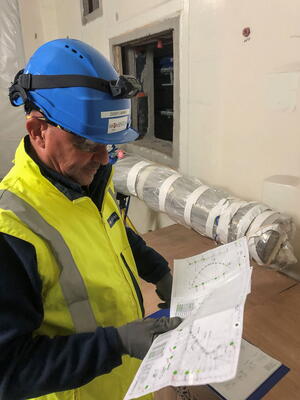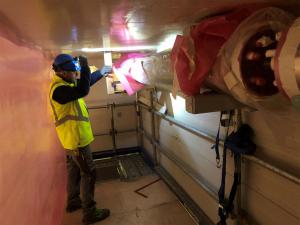The eyes of ITER
"The job is to watch," explains Didier Camman, who is a construction supervisor deployed by MOMENTUM, the Construction Management-as-Agent (CMA) that oversees assembly work at ITER under the overall direction of the ITER Organization. "I am the eyes of the ITER designers, engineers, and managers to make sure work is being done on schedule and according to technical specifications."
The ITER assembly phase represents an enormous construction challenge. In total, the ITER Tokamak and its 15 major plant systems are being built with more than one million components and 10 million parts, sourced through thousands of contracts. On the ground, that translates into a diverse range of construction crews working under different contracts and an encyclopaedic paper trail of technical documentation—from the engineering work packages received from ITER systems owners, to the controllable batches of work assigned under construction work packages and the daily, detailed installation instructions delivered to work contractor teams. So, while every construction project requires supervision due to the inherent differences between work-as-imagined and work-as-done, at ITER it is utterly essential to have extra sets of eyes on the installation process.
In the case of Didier, he has been part of the MOMENTUM construction supervisor team at ITER since 2019. Trained as a welder and previously employed by a pipeline company in Toulouse, France, Didier has hands-on construction experience that allows him to quickly assess the work he supervises.
"I try to offer a critical outside perspective to help people see the big picture more clearly," says Didier. "We're not there to be friends but we're not the police either; we're trying to move the project ahead together."
There are eight MOMENTUM construction supervisors overseeing work packages at the Tokamak and the Tokamak Complex. This MOMENTUM team is working in an integrated manner with other supervisors from the ITER Organization. Didier is currently assigned to the TCC2 assembly contract for the installation of cooling systems, vacuum pipework, and other infrastructure. The work for this contract is being carried out by META SNC—an international construction partnership composed of Ponticelli Freres SAS, Cobra Instalaciones y Servicios SA, and Empresarios Agrupados Internacional SA.
Manufactured by Vitzro Tech in South Korea, the busbars are between 3 metres and 14 metres in length and weigh several hundred kilograms. There will be more than 190 busbars installed for the TCC2 contract and each one carries a current rated at 15 kiloamperes, which is about one hundred times the amount of electricity entering the average home.
As Didier makes his rounds of the Tokamak Complex, he checks the ongoing work on the busbars. First, he confirms each one has been transported into the building without damage to either the busbar or the surrounding infrastructure. Then, he examines the preparation of the surfaces where the busbars will be attached. And, finally, he verifies the bolting and welding.
Everything that Didier sees is noted down and flows up through the construction hierarchy. The initial reports go to the CMA construction manager, Martial Beaury, and any issues are flagged to MOMENTUM's project delivery manager, Marina Gómez Fernández, who works hand in hand with ITER contract responsible officer Alfonso Marquez.
"Because construction supervisors prevent problems before they happen, they aren't very visible," says Marina, "but they are one of the most critical roles in construction."
On the ITER Organization side, Sylvain Chartron of the Construction Management Office oversees the MOMENTUM contract. Prior to arriving at ITER, Sylvain worked on first-of-a kind nuclear projects as well as on offshore wind projects in the Baltic Sea, so he is keenly aware of how crucial it is to detect any issues early on in the process.
"Just like it's easier to solve an issue onshore than once a turbine is out at sea, at ITER it is much better to ensure the construction meets specifications before work moves forward in the Tokamak Complex," says Sylvain.
While in Greek mythology, the hundred-eyed god Argus was eventually lulled to sleep by music played by Hermes, Didier doesn't think ITER's construction supervisors will ever let their guard down.
"It's a privilege to be part of a project with such an important scope," says Didier. "At the end of the day, this is the motivation to always go that extra length to make sure no problems occur."



